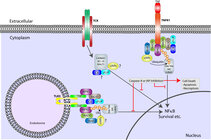Dr. Ian Gentle
Group Leader
| Telephone Lab: | +49 761 270 83663 |
|---|---|
| Telephone Office: | +49 761 270 83622 |
| Fax: | +49 761 270 83703 |
| E-mail: | ian.gentle@uniklinik-freiburg.de |
CV
| 2002 – 2006 | University of Melbourne, Biochemistry and Molecular Biology Department and Bio21 Molecular Science and Biotechnology Institute, Melbourne, Australia |
| 2006 – 2008 | Postdoc – LaTrobe University, Biochemistry Department, Melbourne, Australia |
| 2008 – 2010 | National Health & Medical Research Council (NH&MRC) Postdoctoral Fellow – LaTrobe University, Biochemistry Department, Melbourne, Australia |
| 2010 – 2012 | European Molecular Biology Organisation (EMBO) Long Term Fellow – Universitätsklinikum Freiburg, Department für Medizinische Mikrobiologie und Hygiene, Institut für Medizinische Mikrobiologie und Hygiene |
| 2012 – present | Postdoc – Universitätsklinikum Freiburg, Department für Medizinische Mikrobiologie und Hygiene, Institut für Medizinische Mikrobiologie und Hygiene |

Research Projects
Inhibitor of Apoptosis Proteins (IAPs) in regulation of immune signalling
Summary:
We are interested in both Toll Like Receptors (TLRs) and T Cell Receptor (TCR) complex assembly and signalling regulation. We are specifically interested in the role Inhibitor of Apoptosis Proteins (IAPs) and RIP kinases play at these receptors. Loss of IAP function in either case leads to cell death and disruption in downstream signalling pathways. RIP kinases are able to activate cell death in the absence of caspase activity in a process known as necroptosis, and can be activated by both TLR and TCR activation as well as TNF receptor activation. RIP kinases are targets of IAP mediated ubiquitylation, which regulates their activity. IAP mediated ubiquitylation of RIPK1 and other substrates recruits ubiquitin binding complexes TAB/TAK, LUBAC and IKK in order to activate downstream transcriptional responses such as NF-kB. This can be seen summarized in the simplified figure.
Loss of IAP function can lead to problems in control of infection and potentially pathological inflammation. We use various in vitro models such as gene deficient cell lines and also mouse models of LCMV infection to study how IAPs and RIP kinases can regulate the decision of these receptors to trigger cell death or drive inflammation. We are also interested in how signals from these receptors are switched off. Once activated these receptors must be later switched off in order to avoid prolonged activation leading to inflammation. Loss of autophagy has been shown to lead to severe inflammatory responses in response to triggers such as TLR4 activation by LPS and mutations in autophagy genes have been linked to Crohns disease. We are studying how processes such as autophagy may be involved in silencing receptors by degradation. And how IAP mediated ubiquitylation may be regulating this aspect of signalling.
Center for Microbiology and Hygiene
Institute for Microbiology and Hygiene
Hermann-Herder-Str. 11
D-79104 Freiburg
E-Mail: georg.haecker@uniklinik-freiburg.de
